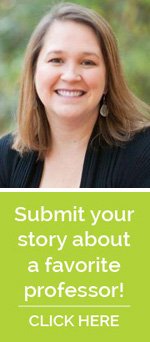Asheville is known nationally for its food scene, so it’s no surprise UNC Asheville Professor Sally Wasileski is a devoted and creative cook.
More surprising is that the accomplished chemistry professor created an entire course that turns the chem lab into an experimental kitchen, allowing students to roast, reduce and bake their way through analytical chemistry.
“I’ve loved to cook and bake my whole life,” Dr. Wasileski said in an interview with UNC Asheville Magazine. “So as I became a chemist and started really learning a lot of chemistry principles, personally I always related that to what I knew about food.”
Teaching The Food of Chemistry is one way Dr. Wasileski aims to make the subject more approachable for students. Since coming to UNC Asheville in 2003, she’s made it her mission both to encourage more chemistry majors and get non-science majors more engaged with chemistry. She teaches several upper-level classes in addition to the highly popular food course.
The Food of Chemistry is part of UNC Asheville’s “Food for Thought” curriculum, a cluster of courses that reach across different disciplines but focus on a single issue. Students take classes in chemistry, sociology, biology and environmental science that focus on all aspects of food.
The aim is to “help the student become an informed consumer of food by providing a platform for discussion of what we eat, why we eat, where our food comes from and how it is processed, and how food affects our bodies and health.”
Dr. Wasileski’s course gives students the chance to analyze their favorite snacks down to the molecular level. They even sample dining hall grub, breaking down the University’s offerings to analyze sodium content and chemical reactions.
The food class is just one example of Dr. Wasileski’s commitment to a more engaged form of science education. She is known for research projects that send students into the community to measure water quality, take soil samples and generally connect chemistry to civic health.
She has melded her love of chemistry with a deep interest in student learning, publishing research papers on the role of different teaching styles and experiences on student success.
Those efforts culminated in a National Science Foundation grant for the UNC Asheville Chemistry Scholars, which offers funds and academic support to encourage chemistry majors. Since Dr. Wasileski started the program in 2011, the number of chemistry majors at Asheville has expanded 170%.
“She was always talking about bigger picture,” said Anna Goldstein, a 2007 graduate and now a postdoctoral fellow at Harvard. “Why would we do this research, what’s the point, where does it fit into the bigger picture…? That was always at the forefront.”
That ability to connect complex science with real-world applications helped make Dr. Wasileski a winner of the 2016 UNC Board of Governors Excellence in Teaching Award.
And it’s helped make UNC Asheville, an institution most commonly associated with liberal arts, a model for engaged teaching in science.


Leave a Reply